Rugby World Cup: Can India fall in love with rugby?
- Published
There are plans to grow rugby in India, but are there the necessary playing and financing resources?
On the streets of Kolkata, I carried out a fairly unscientific experiment - showing passers-by a rugby ball and asking if they knew which sport it was used for.
"Hockey?" suggested a teenager uncertainly. "Basketball?" ventured another.
Most people simply shook their heads. "Sorry," said one middle-aged man, sipping on a glass of tea. "We don't play that game here."
For fans of rugby union, Kolkata - formerly called Calcutta - is synonymous with the Calcutta Cup - the annual game played between England and Scotland that had its origins here in the 1870s.
The city remains India's rugby capital - and although about 40,000 people nationwide play the game according to the sport's administrators - that lack of recognition is its biggest struggle.
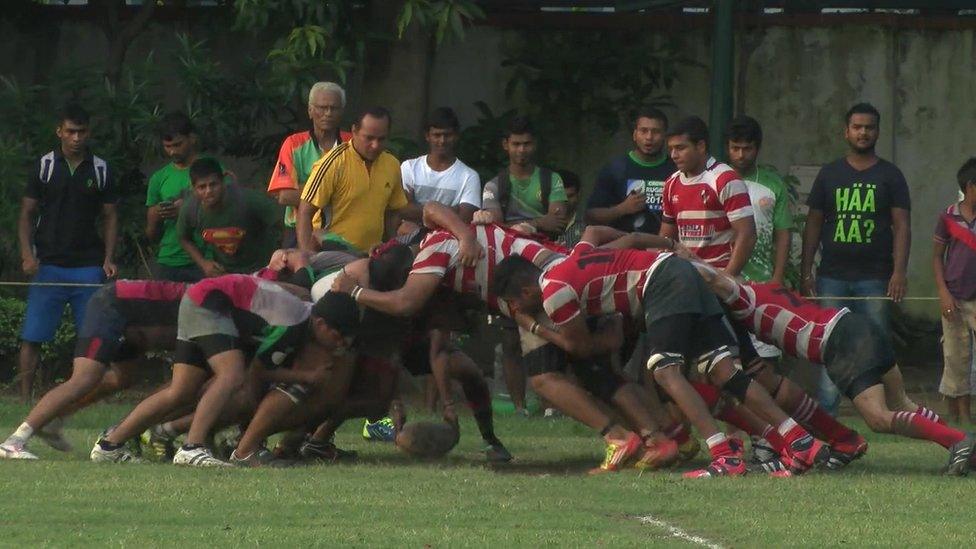
Indian rugby is facing competition from a number of other sports
"Rugby is basically not known as a sport," says Noomi Mehta, president of the Indian Rugby Football Board - recalling the game's comically-inaccurate portrayal in a local Tamil film - a clip of which is now doing the rounds on the internet. "It was basically gang warfare on a field."
He can see the funny side, but says the lack of understanding is making it hard for the sport to attract the money needed to spread the game and encourage promising players.
"Getting sponsors is hard. We have had them in the past, but they stay for a year or two years and then they look elsewhere," Mr Mehta says.
A league of their own?
Indian rugby remains fully amateur - with power centred around just two clubs - one in Kolkata and another in Mumbai. Both are members-only establishments - set up way back under British rule.
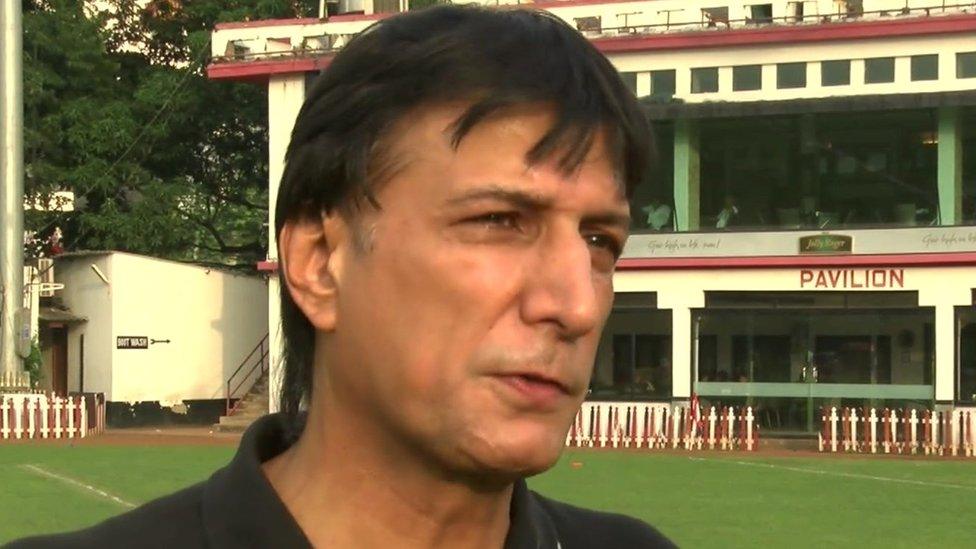
The IRFU's Mehta says a superstar league in India would attract sponsors and TV coverage
The welcome is warm and friendly, and the oak-panelled clubhouses and trophy cabinets carry an air of history and tradition - or elitism - depending on your point of view.
But even having basic facilities, like changing rooms, make them the go-to venues for almost all the country's major tournaments.
Shaking off that stuffy image - and showing more international rugby on Indian television - would be a good way to popularise the game says Mr Mehta, who thinks rugby's future lies in India's rural hinterland.

The Calcutta Cup
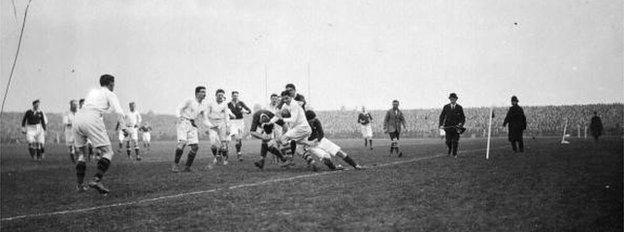
The Calcutta Cup is the trophy presented to the winner of the England versus Scotland rugby union match which takes place during the annual Six Nations Championship.
After the introduction of rugby to India in 1872, the Calcutta (Rugby) Football Club was set up by former students of Rugby School in January 1873.
It joining the Rugby Football Union in 1874, but with the departure of a local British army regiment interest in the sport waned. The members decided to disband and withdrew the club's funds from the bank, which were in Silver Rupees.
These were then melted down and made into a cup which they presented to the RFU in 1878, on the understanding that it should be competed for annually.

And like football, hockey, badminton and (Indian sport) kabaddi have already done - Mr Mehta says rugby could learn from the success of cricket's Indian Premier League - creating a made-for-television short format tournament with Bollywood owners, music, and razzmatazz that attracts international players by making it financially worth their while.
"You can find sponsors at that level," Mr Mehta confidently predicts.
'Revival'
Not that the game is totally devoid of backers. Vehicle specialist Birla Tyres sponsors an annual Kolkata tournament - though the sums involved remain quite small.
"On the face of it there's no business reason to sponsor the sport of rugby, because it's a very closed circle of people who really watch the sport, play the sport," says Birla Tyre's chief executive Arvind Singh.
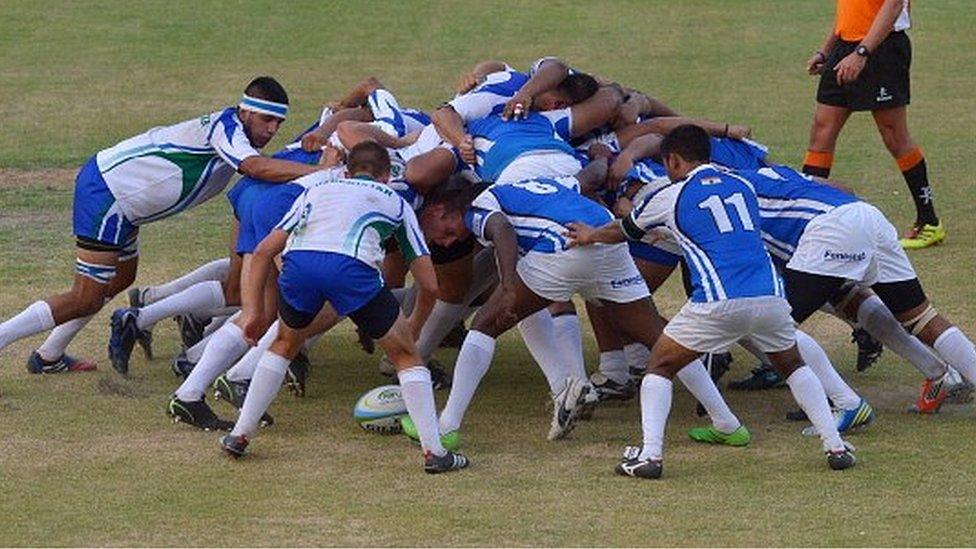
India's attempt to qualify for the 2015 Rugby World Cup fell at the Asian qualifying stage
"But we didn't want to be just another company that sponsored cricket and were looking for other opportunities.
"The Rugby World Cup gets watched in India - perhaps not as widely as the football or the cricket but it does get watched. Rugby will have a revival and our participation in the sport of rugby means that as the sport revives, our association with it will mean our visibility around rugby arrives and grows."
Star seeking
Getting more youngsters playing the game is one obvious way to grow rugby's appeal.
And in the Wattgung suburb of Kolkata, a slum area and one of the city's best-known red-light districts, I find dozens of boys and girls who are picking up a rugby ball rather than a cricket bat.
Their "pitch" is a yard full of shipping containers, reached by climbing a ladder and shimmying over a wall - but that is no deterrent.
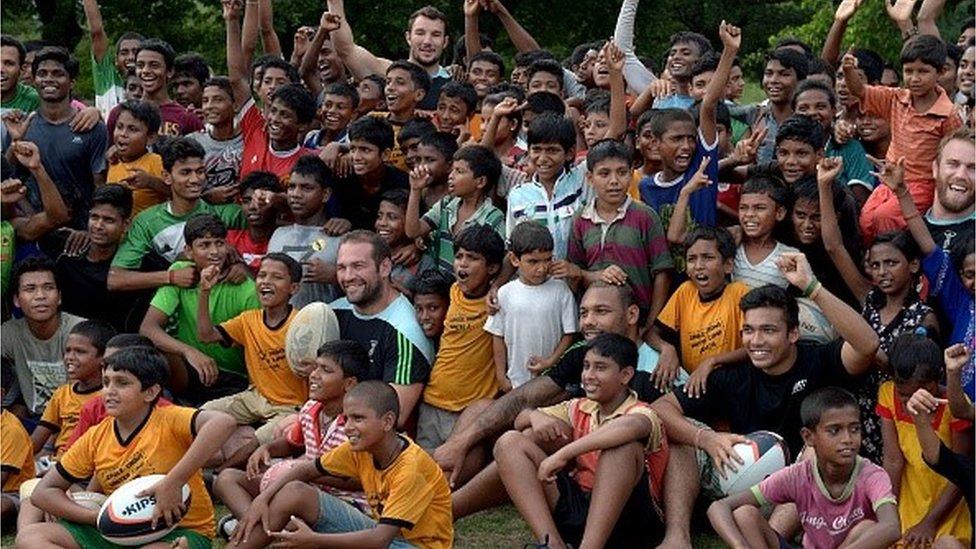
Players from UK rugby team Harlequins have also helped coach Kolkata youngsters
And that enthusiasm is down to schemes like Khelo Rugby - run by another Kolkata club Jungle Crows.
"Finding the next Jonah Lomu would be great", says former British diplomat turned project founder Paul Walsh. But this is as much about supporting some of the city's poorest children, helping them stay in school, and steering them away from drugs and prostitution as it is about coaching rugby.
Every Saturday morning there are training sessions on a well-cared-for field close to the city centre, with youngsters tackling crash pads, and running through passing drills, often in bare feet.
But standards are improving - and players regularly go on to play for clubs and even their country (India is currently ranked 74th in the word and 12th in Asia).
Money ball
All the coaches are volunteers - often graduates of the project themselves - but not surprisingly things are also tight financially at the grassroots.
"Cricket sucks in all the money, football is very popular, then you go to hockey, kabbadi," says Mr Walsh.
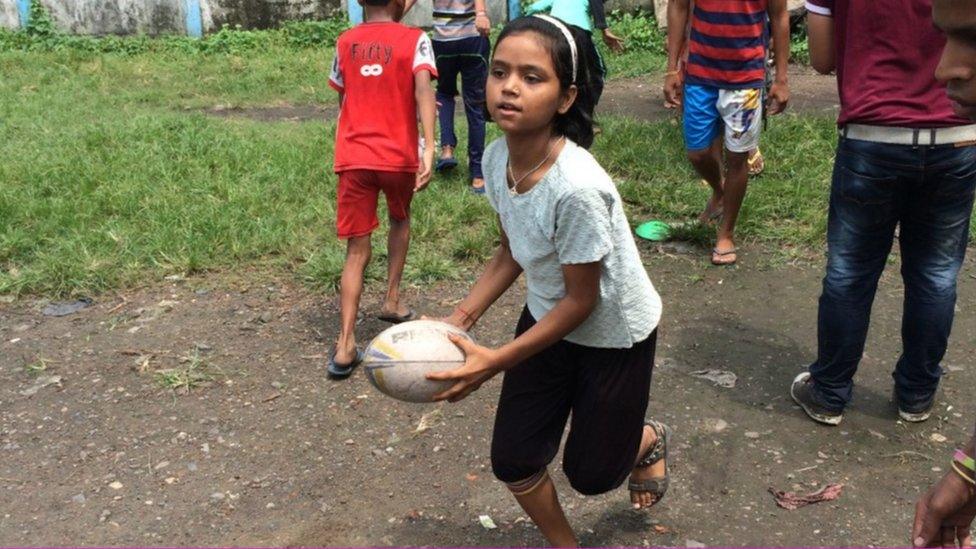
Youngsters in India are becoming increasingly more familiar with a rugby ball
"Rugby is at the end of a long line of other sports. And perhaps, it will never be the most popular sport in India, but in a way that's nice as well. The kids love the fact that they play something that perhaps friends at school don't play, so it's special for them."
The 2019 Rugby World Cup in Japan will be the first time the event has been held in Asia.
And while India has very little chance of reaching the tournament anytime soon, creating a generation of players who have absolutely no trouble recognising a rugby ball is not a bad start.